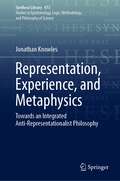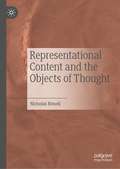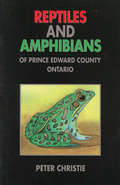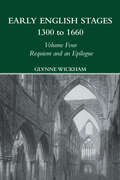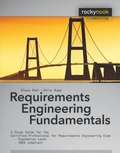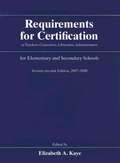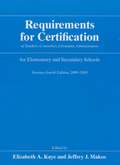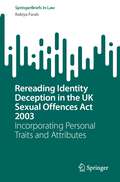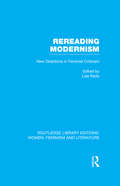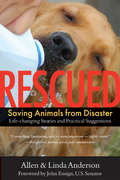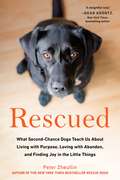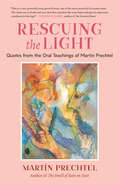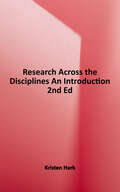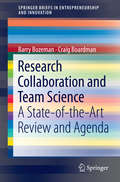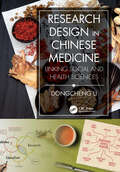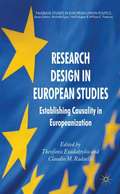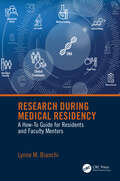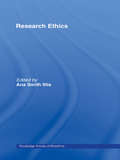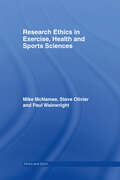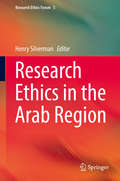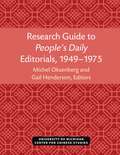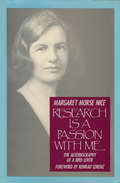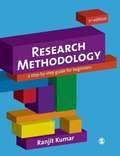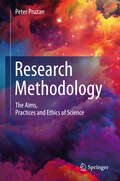- Table View
- List View
Representation, Experience, and Metaphysics: Towards an Integrated Anti-Representationalist Philosophy (Synthese Library #473)
by Jonathan KnowlesThis book provides an original perspective on the debate about anti-representationalism and the nature of philosophy. This debate has come to prominence in recent years through the work of people like Richard Rorty, Paul Horwich, Huw Price and Amie Thomasson. It is the first book to explicitly consider this well-known pragmatist kind of anti-representationalism in relation to anti-representationalist views in other areas of philosophy, in particular the philosophy of perception and cognitive science. Taking as its point of departure the neo-pragmatism of Rorty and Price, it critiques the way these (and other) thinkers develop, on this basis, a positive view of philosophy and its remit. By examining the debate about representationalism versus anti-representationalism in perception and cognitive science it provides a different way of understanding the significance of neo-pragmatism, as well as providing an independently interesting perspective on these other debates. A central idea in this perspective involves distinguishing between a world-for-us and a world-in-itself, though in a different way from Kant and many other philosophers. The book extends these reflections to examine questions about realism and the limits of metaphysics for anti-representationalist pragmatism, arguing the view can uphold a common sense kind of realism, as well as the value of distinctively philosophical enquiry in metaphysics.
Representational Content and the Objects of Thought
by Nicholas RimellThis book defends a novel view of mental representation—of how, as thinkers, we represent the world as being. The book serves as a response to two problems in the philosophy of mind. One is the problem of first-personal, or egocentric, belief: how can we have truly first personal beliefs—beliefs in which we think about ourselves as ourselves—given that beliefs are supposed to be attitudes towards propositions and that propositions are supposed to have their truth values independent of a perspective? The other problem is how we can think about nonexistents (e.g., Santa Claus) given the widespread view that thought essentially involves a relation between a thinker and whatever is being thought about. The standard responses to this puzzle are either to deny that thought is essentially relational or to insist that it is possible to stand in relations to nonexistents. This book offers an error theory to the problem. The responses from this book arise from the same commitment: a commitment to treating talk of propositions—as the things towards which our beliefs are attitudes—as talk of entities that actually exist and that play a constitutive and explanatory role in the activity of thought.
Reptiles and Amphibians of Prince Edward County, Ontario
by Peter ChristieReptiles and Amphibians of Price Edward County, Ontario is a comprehensive look at the little-known residents of a well-known corner of rural Ontario. Complete with descriptions and illustrations, the book provides serious and amateur naturalists with a thorough compilation of recent and historic reports of the some thirty species of turtles, snakes, frogs, toads and salamanders that are – or once were – found in this unique part of the province. The text acquaints readers with the likelihood of encountering these fascinating creatures in the area while maps of all known records illustrate where these animals have been uncovered in the past. Discussions of changes in species abundance offer a sense of the shifts that have taken place in reptile and amphibian communities in the area over time.
Requiem and an Epilogue
by Glynne WickhamFirst published in 2002.This volume forms part of the 5 volume set Early English Stages 1300-1660. This set examines the history of the development of dramatic spectacle and stage convention in England from the beginning of the fourteenth century to 1660.
Requirements Engineering Fundamentals
by Chris Rupp Klaus PohlIn practice, requirements engineering tasks become more and more complex. In order to ensure a high level of knowledge and training, the International Requirements Engineering Board (IREB) worked out the training concept "Certified Professional for Requirements Engineering", which defines a requirements engineer's practical skills on different training levels. The book covers the different subjects of the curriculum for the "Certified Professional for Requirements Engineering" (CPRE) defined by the International Requirements Engineering Board (IREB). It supports its readers in preparing for the test to achieve the "Foundation Level" of the CPRE.
Requirements for Certification of Teachers, Counselors, Librarians, Administrators for Elementary and Secondary Schools (72nd edition)
by Elizabeth A. KayeThis annual volume offers the most complete and current listings of the requirements for certification of a wide range of educational professionals at the elementary and secondary levels, listed by state. Requirements for Certification is a valuable resource, making much-needed knowledge available in one straightforward volume. 2007 edition.
Requirements for Certification of Teachers, Counselors, Librarians, Administrators for Elementary and Secondary Schools 2009-2010 (74th edition)
by Elizabeth A. Kaye Jeffrey MakosThis annual volume offers the most complete and current listings of the requirements for certification of a wide range of educational professionals at the elementary and secondary levels, ordered by state. Requirements for Certification is a valuable resource, making much-needed knowledge available in one straightforward volume.
Rereading Identity Deception in the UK Sexual Offences Act 2003: Incorporating Personal Traits and Attributes (SpringerBriefs in Law)
by Rakiya FarahDoes the Sexual Offences Act (SOA) 2003 provide for consent to be vitiated in all the circumstances we think it should? Can, and should, section 76(2)(b) (the impersonation provision) be read to include a different class of identity deceptions? How should the concept of personal identity be understood in this context?While the concept has had some airing in the courts, and the distinction between identity and attributes of the person softened, the law on rape still fails to give proper effect to identity deception and leaves many questions unanswered. This book offers a novel take on the problem of sexual deception. Through meticulous interrogation of the meaning and normative implications of the concept of personal identity, it challenges the law’s restrictive approach and argues that qualitative identity is, like numerical identity, normatively important. This book provides a comprehensive and nuanced analysis of the philosophical, theoretical, and psychological experimental literature on personal identity, marshalling relevant insights to support a broader reading of the impersonation provision. The argumentative thrust of the book is an extended equivalence thesis, which links numerical with qualitative identity. In this task, it engages in capacious exploration of different kinds of impersonation, at each juncture leading the reader to a more permissive understanding. Guided by the principle of consistency, the central thesis is that certain deceptions about personal traits should be unlawful based on existing prohibitions with which there is equivalence. A central contribution of the book is the articulation of a theoretical framework to support a richer understanding of identity, giving due attention to its qualitative aspects. This new framework is applied at stage three of the equivalence thesis to explain the relationship between individual traits and identity change. By implication, a potentially wide scope of consent-vitiating deceptions is endorsed. This presents a challenge to those who would defend more stringent limits. The book thus invites further discussion on the implications of this approach for the law on rape and indicates areas for further research and attention.
Rereading Modernism: New Directions in Feminist Criticism (Routledge Library Editions: Women, Feminism and Literature)
by Lisa RadoUntil about 1986, feminists generally considered modernism a reactionary, misogynist, and hegemonic mire not worth investigating. Since then enough studies of modernism have appeared that 17 feminist critics can now review and debate their treatment of the period. They evaluate the progress and goals of the new era of modernist scholarship. As the authors in this volume suggest, instead of condemning writers for not practicing or portraying an acceptable politics of gender, we ought instead to show how their assumptions about the nature of the sexes inform their texts, both in their creation and in their reception. This also allows examination of the complex and changing relationship between human subjectivity and aesthetics. This volume is a highly reflective dialogue, introspective and evaluative, at a moment of crisis within modernist studies and feminist studies. The analysis of critical work on early-twentieth-century literature not only helps reread and redefine a definition of modernism; it also intends to redirect and reintegrate feminist theory.
Rescued
by Linda Anderson Allen AndersonRescued tells the inspiring stories of dedicated organizations and heroic volunteers who saved animals and reunited them with loved ones after Hurricane Katrina. Heart-wrenching experiences and dramatic action photos open a portal into the unheralded world of animal shelters, sanctuaries, and charities that are emerging nationwide and becoming an important social movement. Chock-full of lifesaving information, this book prepares you to quickly and safely evacuate with animals in any emergency.
Rescued: What Second-Chance Dogs Teach Us About Living with Purpose, Loving with Abandon, and Finding Joy in the Little Things
by Peter ZheutlinDiscover the astonishing lessons rescue dogs can teach us about life, love, and ourselves In the follow-up to his New York Times bestseller Rescue Road, acclaimed journalist Peter Zheutlin offers a heartwarming and often humorous new look into the world of rescue dogs. Sharing lessons from his own experiences adopting Labs with large personalities as well as stories and advice from dozens of families and rescue advocates, Zheutlin reveals the surprising and inspiring life lessons rescue dogs can teach us, such as: - How to “walk a mile in a dog’s paws” to get a brand-new perspective - Living with a dog is not one continuous Hallmark moment—but it’s never dull! - Why having a dog helps you see your faults and quirks in a new light, even if you can’t “shed” them completely - How to set the world right, one dog at a time For anyone who loves, lives with, or has ever wanted a dog, this charming book shows how the dogs whose lives we save can change ours for the better too.
Rescuing the Light: Quotes from the Oral Teachings of Martín Prechtel
by Martín PrechtelA collection of quotes and sayings from the oral teachings of a leading thinker, writer and teacher of indigenous spirituality.Martin Prechtel is widely recognized as a profound and beloved teacher for our times. Raised in the Tzutujil Maya shamanic tradition, he has dedicated his life to the preservation and promulgation of indigenous spirituality. Rescuing the Light is a collection of Prechtel's quotes and sayings spanning the course of fifteen years, and recorded at Bolad's Kitchen, a four-year course in New Mexico where students from all walks of life gather to receive hands-on training in language, history, cooking, farming, and crafts. Artist, musician, and storyteller, Prechtel teaches and initiates with passion and eloquence, awakening his students to the sacred realities present everywhere and at all times. The quotes of wisdom and inspiration collected in these pages are earth-centric and animist. Divided into thematic sections, they range from the poetic and witty to the serious and direct. Sharing his deep shamanic wisdom within a grand overview of human history, Prechtel shows us how we can reconnect with the unique and unsuspected manifestations of our own sacred selves.
Research Across the Disciplines: An Introduction
by Kristen HarkDoing research is like being a detective. Both researchers and detectives are trying to find out something. Both are asking and answering questions. Both are trying to put together a puzzle to come up with a solution. In both, answering questions leads to more questions. And, in both, seeing patterns is crucial to solving the puzzle. <p><p>Research Across the Disciplines: An Introduction provides students with information about the foundations of research methods, the choices as scholars make, and the methodological decisions driving to balance the desire to know and inquire into interesting communication questions while instilling enthusiasm about the process.
Research Collaboration and Team Science
by Craig Boardman Barry BozemanToday in most scientific and technical fields more than 90% of research studies and publications are collaborative, often resulting in high-impact research and development of commercial applications, as reflected in patents. Nowadays in many areas of science, collaboration is not a preference but, literally, a work prerequisite. The purpose of this book is to review and critique the burgeoning scholarship on research collaboration. The authors seek to identify gaps in theory and research and identify the ways in which existing research can be used to improve public policy for collaboration and to improve project-level management of collaborations using Scientific and Technical Human Capital (STHC) theory as a framework. Broadly speaking, STHC is the sum of scientific and technical and social knowledge, skills and resources embodied in a particular individual. It is both human capital endowments, such as formal education and training and social relations and network ties that bind scientists and the users of science together. STHC includes the human capital which is the unique set of resources the individual brings to his or her own work and to collaborative efforts. Generally, human capital models have developed separately from social capital models, but in the practice of science and the career growth of scientists, the two are not easily disentangled. Using a multi-factor model, the book explores various factors affecting collaboration outcomes, with particular attention on institutional factors such as industry-university relations and the rise of large-scale university research centers.
Research Design in Chinese Medicine: Linking Social and Health Sciences
by Dongcheng LiResearch Design in Chinese Medicine: Linking Social and Health Sciences is an innovative and comprehensive guide that bridges the ancient wisdom of Traditional Chinese Medicine (TCM) with modern research methods in social and health sciences. Authored by an expert with a background in Chinese medicine and a doctorate in education from Johns Hopkins University, this book is set to revolutionize the way TCM is studied and practiced in the contemporary world.Designed for a diverse readership, from TCM students and practitioners to those in social sciences and holistic medicine, the book provides a unique integration of traditional techniques and modern research approaches. It offers invaluable resources for Doctor of Acupuncture and Herbal Medicine (DAHM) students, helping them deepen and refine their research skills. Additionally, it serves as an essential academic tool for educators in TCM and related fields, perfectly suited for course adoption in over 50 accredited acupuncture schools within the U.S. and extending its reach globally.Research Design in Chinese Medicine: Linking Social and Health Sciences offers a balanced emphasis on both qualitative and quantitative research approaches. This holistic methodology ensures that readers gain a full spectrum of knowledge, from formulating research questions to conducting ethical studies. The step-by-step guide provided in the book is supplemented with a wealth of resources, including a dedicated website, downloadable templates, and case studies, making it not just a book but a complete learning experience.The book is positioned to be a key resource in the field of TCM research. Its interdisciplinary approach and practical guidance make it invaluable to anyone looking to conduct meaningful research in TCM. The combination of the author's expertise and the practical tools offered makes this book a must-have for students, practitioners, and researchers in the field.
Research Design in European Studies
by Theofanis Exadaktylos Claudio M. RadaelliA seminal text in European studies, which addresses issues of research design and causal analysis. The chapters draw on different methodological traditions, notions of causality, and methods and use strong research design to address substantive problems in public policy, party politics, foreign policy and legislative studies.
Research During Medical Residency: A How to Guide for Residents and Faculty Mentors
by Lynne M. BianchiThis book is a guide for medical residents and faculty in the fundamentals of clinical research, publication practices, and conference skills. It offers advice on how to incorporate scholarly activities into training routines, so the process becomes more manageable and less burdensome. Suggestions for pursuing other scholarly activities, outside of clinical research, are also offered. Participation in research and other scholarly activities is a requirement for graduation from medical residency programs in the United States and many other countries. Faculty physicians who train residents are also required to produce annual scholarly work. Adding scholarship onto an already long list of requirements often feels a bit daunting to medical residents and the faculty who teach them. Fortunately, there are many forms of scholarly activity, including basic and clinical research, quality improvement projects, and educational assessments, so everyone can find interesting and feasible projects to complete. This valuable reference provides users with a reliable source to turn to whenever they have questions on how to develop, conduct, publish, or present a research project. Written with the perspective of busy faculty and residents in mind, the content balances the need for enough detail to be instructive with the need for quick access to key points.
Research Ethics (Routledge Annals of Bioethics #Vol. 1)
by Ana Smith IltisMedicine in the twenty-first century is increasingly reliant on research to guarantee the safety and efficacy of medical interventions. As a result, the need to understand the ethical issues that research generates is becoming essential. This volume introduces the principal areas of concern in research on human subjects, offering a framework for understanding research ethics, and the relationship between ethics and compliance. Research Ethics brings together leading scholars in bioethics and the topics covered include the unique concerns that arise in specific areas of research such as gene therapy and stem cell research. Individual chapters also address the ethical issues that occur when conducting research with specific populations such as infants or adolescents, and the volume looks at important emerging questions in human subjects research, namely financial conflicts of interest and the interpretation of scientific data.
Research Ethics in Exercise, Health and Sports Sciences (Ethics and Sport)
by Paul Wainwright Stephen Olivier Mike J. McNameeResearch Ethics in Exercise, Health and Sports Sciences puts ethics at the centre of research in these rapidly expanding fields of knowledge. Placing the issues in historical context, and using informative case studies, the authors examine how moral theory can guide research design, education, and governance. As well as theoretical analysis, key practical concerns are critically discussed, including: informed consent anonymity, confidentiality and privacy plagiarism, misappropriation of authorship, research fraud and ‘whistleblowing’ ethics in qualitative research vulnerable populations trans-cultural research. Providing an accessible and robust theoretical framework for ethical practice, this book challenges students, researchers and supervisors to adopt a more informed and proactive approach to ethics in exercise, health and sports research. This insightful text will be of great interest to those taking a kinesiology, human movement, sport science or sport studies degree course.
Research Ethics in the Arab Region
by Henry SilvermanThis book addresses the pressing issues involved with the ethical conduct of research in one developing world region - the Arab Region. Clinical research has soared in the developing world -as pharmaceutical companies continue their search for regions with large, treatment naive populations - including the Arab region, and has profound implications for the health and the economies for the area. The ethical issues involved with the conduct of such research, however, have so far not been adequately addressed. This volume presents the issues regarding research ethics and research governance that have relevance for health authorities, regulators, industry, and academia. As a multi-authored volume it includes both international and local experts on ethical issues in research, representing all stakeholders, thus presenting a balanced view on this timely topic.
Research Ethics:
by Gary ComstockEducation in the responsible conduct of research typically takes the form of online instructions about rules, regulations, and policies. Research Ethics takes a novel approach and emphasizes the art of philosophical decision-making. Part A introduces egoism and explains that it is in the individuals own interest to avoid misconduct, fabrication of data, plagiarism and bias. Part B explains contractualism and covers issues of authorship, peer review and responsible use of statistics. Part C introduces moral rights as the basis of informed consent, the use of humans in research, mentoring, intellectual property and conflicts of interests. Part D uses two-level utilitarianism to explore the possibilities and limits of the experimental use of animals, duties to the environment and future generations, and the social responsibilities of researchers. This book represents a fresh approach to research ethics. It will engage the moral imaginations of graduate students in all disciplines.
Research Guide to People’s Daily Editorials, 1949–1975
by Michel Oksenberg Gail HendersonAn indispensable aid to researching a crucial series of policy statements, the present guide provides access to the only continuous source from China which illuminates high-level policy. Includes an extensive subject index.
Research Is a Passion With Me: The Autobiography of a Bird Lover
by Konrad Lorenz Margaret Morse NiceIn her incredibly productive lifetime (1883-1974), American-born ornithologist Margaret Morse Nice earned the admiration of ornithologists and naturalists in far distant lands. Research Is a Passion With Me is an enthralling autobiography of one of the great individuals in her field and of her time. The prominent California nature writer, Donald Peattie, in commenting on Margaret Nice’s writing ability, stated: "Your art of telling is so good that it conceals how good the science is." And Professor Ernst Mayer of Harvard University said: "Margaret Nice was a remarkable person and only those who know the state of American ornithology when she started her work will appreciate her contribution." "An extraordinary bird watcher. Every summer she and her husband would gather the girls, pack their old car with camping gear, and head off into the wilds to look for new birds. This eccentric way of living was unusual in the early 1920s, but even their youngest daughter adjusted to it. Their older girls shinnied up trees to observe nests and helped in housekeeping tasks around the campsite."- Marcia Bonta, Bird Watcher’s Digest
Research Methodology: A Step-By-Step Guide for Beginners (3rd Edition)
by Ranjit KumarThe Third Edition of Research Methodology: A Step-by-Step Guide for Beginners integrates various quantitative and qualitative methodologies into eight practice-based-steps, providing lots of examples throughout to link theory with practice. Written specifically for students with no previous experience of research and research methodology, the writing style is simple and clear and the author presents this complex subject in a straightforward way that empowers readers to tackle research with confidence. The book has been revised and updated to include extended coverage of qualitative research methods in addition to existing comprehensive coverage of quantitative methods. There are also brand new learning features such as reflective questions throughout the text to help students consolidate their knowledge.
Research Methodology: The Aims, Practices And Ethics Of Science
by Peter PruzanThisbook is an in-depth guide to effective scientific research. Ranging from thephilosophical to the practical, it explains at the outset what science can -and can't - achieve, and discusses its relationship to mathematics and laws. Theauthor then pays extensive attention to the scientific method, including experimentaldesign, verification, uncertainty and statistics. A major aim of the book is tohelp young scientists reflect upon the deeper aims of their work and make the best use of theirtalents in contributing to progress. To this end, it also includes sections onplanning research, on presenting one's findings in writing, as well as onethics and the responsibilities of scientists.
